(Life Issues Institute) Abortion continues to be on a collision course with modern science and medicine.
Earlier this year a prestigious medical group released an analysis that is sure to make more converts to the pro-life side, and I want to make sure you were aware of it.
The American College of Pediatricians (ACPeds) published a position statement entitled, Fetal Pain: What is the Scientific Evidence. It is a comprehensive review of the scientific literature on pain experienced by unborn babies and neonates. Their findings were another milestone victory in our efforts to protect unborn babies from abortion.
Standard medical care for newborns was much different before the late 1980’s when the medical consensus was that neonates didn’t feel pain. But that changed in 1987 with a landmark study published in the New England Journal of Medicine, called “Pain and Its Effects in the Human Neonate and Fetus”.
The research left unsettled questions, however, the evidence it did reveal warranted “re-evaluating the medical standard of care in favor of providing local and general anesthesia during invasive procedures.”
[Click here to subscribe to Pregnancy Help News!]
A 1992 study on babies who underwent cardiac surgery was another watershed moment in the medical community. Newborns with congenital heart defects were either given “lighter anesthesia” or “deep anesthesia” during surgical repair. Four of the 15 with lighter anesthesia died before being discharged from the hospital. But all of the 30 babies who received appropriate anesthesia not only survived but did significantly better than babies with less pain control. The research was not replicated for obvious ethical reasons; however, it thankfully impacted the way babies were treated moving forward.
At the heart of the ACPeds analysis, were two different theories to determine if unborn babies perceive pain. (very briefly summarized here)
- One is that nociception, the physical reaction to noxious stimuli, is possible in preborn children and an indicator that they feel pain.
- The other according to the International Association for the Study of Pain was that in addition to nociception there must be an “emotional, experiential awareness of pain.”
More details are available in the ACPeds statement.
The ACPeds analysis concluded – as have a growing number of researchers – that the first definition accurately demonstrates unborn babies feel pain at 12 weeks gestation or possibly earlier, and efforts must be made to provide effective anesthesia.
British professor and pain expert Stuart Derbyshire agrees. Dr. Derbyshire supports abortion, has been a consultant for Planned Parenthood, and had previously determined that unborn babies don’t feel pain until twenty-four weeks. Since then he was the lead author in a study that concluded unborn babies can feel pain at 12 weeks.
ACPeds concluded their position statement with words I am convinced will be on the right side of history.
“Medicine’s double standard of acknowledging pain capability in wanted premature babies while denying it in unwanted unborn babies of the same gestational ages is unconscionable.”
Of course, we don’t measure the worth of a child’s life by whether he or she can feel pain in their mothers’ wombs. Still, this new finding is a dramatic milestone in nudging dubious Americans into the pro-life camp.
Few can stomach the concept of a baby experiencing excruciating pain while being unmercifully torn apart in her mother’s womb.
Science and medicine have become effective tools for pro-life education, so let’s make the best use of them to save more lives!
Tweet This: Acknowledging pain capability in wanted premature babies while denying it in unwanted unborn babies at the same age is unconscionable
Editor's note: This article was published by Life Issues Institute and is reprinted with permission.





